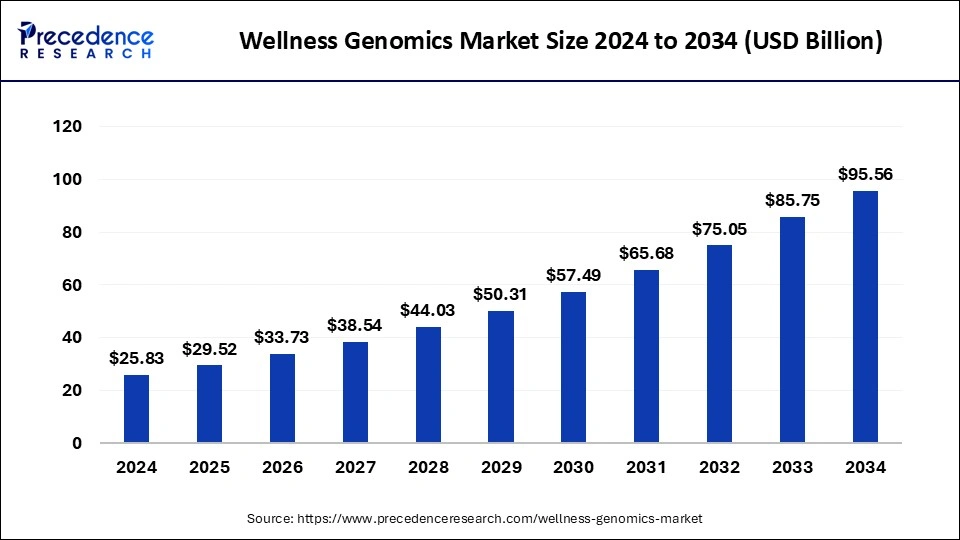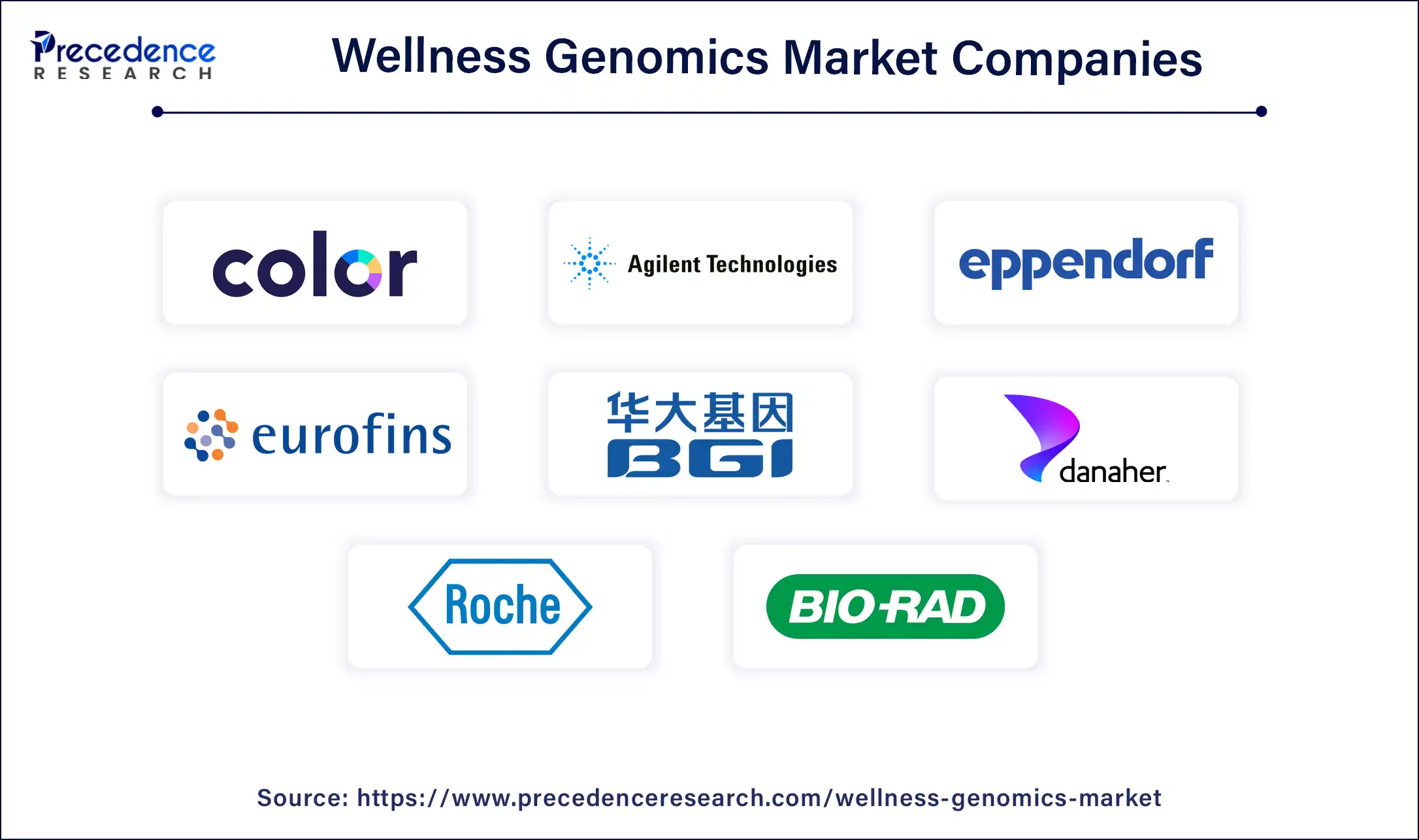March 2025
The global wellness genomics market size is calculated at USD 29.52 billion in 2025 and is forecasted to reach around USD 95.56 billion by 2034, accelerating at a CAGR of 13.98% from 2025 to 2034. The market sizing and forecasts are revenue-based (USD Million/Billion), with 2024 as the base year.
The global wellness genomics market size was estimated at USD 25.83 billion in 2024 and is predicted to increase from USD 29.52 billion in 2025 to approximately USD 95.56 billion by 2034, expanding at a CAGR of 13.98% from 2025 to 2034. Personalized genomics is one of the rising trends in personalized healthcare solutions that target individual genetic profiles to improve health outcomes is driving the wellness genomics market.

The wellness genomics market has been rising quickly due to consumer awareness of the potential advantages of individualized genetic insights for wellness and health. There has been a change in the healthcare industry toward consumer-driven treatment. People are going to genetic testing to learn more about their hereditary susceptibilities to different diseases, improve their exercise regimens, and customize their diets.
Applications of the wellness genomics market include fitness genetics (individualized exercise regimens), pharmacogenomics (medication customization based on genetic parameters), nutrigenomics (individualized nutrition based on genetic profile), and predisposition testing for disorders. Thanks to developments in DNA sequencing technologies and bioinformatics, genetic testing is now more affordable and available to both consumers and healthcare providers.
Globally, there are differences in the regulatory frameworks around genetic testing; some areas have more stringent laws than others. For the participants of the wellness genomics market, adhering to data protection rules and guaranteeing the precision of genetic tests are essential factors. Notwithstanding the potential for expansion, there are still a number of obstacles to overcome, including permission and privacy issues, the necessity of genetic counseling, the interpretation of complicated genetic data, and the incorporation of genomic data into healthcare processes.
| Report Coverage | Details |
| Market Size by 2034 | USD 95.56 Billion |
| Market Size in 2025 | USD 29.52 Billion |
| Market Growth Rate from 2025 to 2034 | CAGR of 13.98% |
| Largest Market | North America |
| Base Year | 2024 |
| Forecast Period | 2025 to 2034 |
| Segments Covered | Type, Setting Type, Application, and Regions |
| Regions Covered | North America, Europe, Asia-Pacific, Latin America, and Middle East & Africa |
Growing geriatric population
People frequently have complex health difficulties as they age, necessitating individualized treatment plans. Wellness genomics provides individualized insights on hereditary risks and predispositions, making it possible to provide older patients with more focused healthcare interventions. Elderly people are more likely to suffer from age-related chronic illnesses like cancer, neurological disorders, and cardiovascular ailments.
Understanding the genetic components causing these disorders through genomics can inform therapy plans and lifestyle changes. Consent, privacy, and the responsible use of genetic information are ethical issues that arise when the elderly use genomics technologies. These elements play a major role in determining how markets and regulatory structures are shaped.
Limited clinical utility
Strong scientific evidence connecting certain genetic variations to wellness practices or health outcomes is lacking in many genetic tests sold for wellness goals. Clinicians find it challenging to evaluate results confidently and offer recommendations as a result. Concerns with genetic discrimination, privacy, and the psychological effects of potentially confusing or disturbing results are some ethical issues that may arise from genetic testing for wellness.
Ensuring the clinical validity, accuracy, and dependability of genetic testing promoted for wellness may provide regulatory problems. Their acceptance and assimilation into clinical practice may be impacted by this. Genetic testing can be costly, and consumers, insurers, and healthcare professionals may wonder whether it is cost-effective to use these tests for wellness purposes, particularly when clinical relevance is restricted.
Digital health platforms
In the wellness genomics market, digital health platforms are essential for combining genetic data with tailored health and well-being advice. These platforms provide individuals with insights about their genetic predispositions connected to health and well-being by utilizing advancements in genomics, data analytics, and digital technology. These platforms enable DNA analysis of samples (such as blood or saliva) submitted by individuals for genetic testing services.
Understanding the genetic variations linked to a range of characteristics related to health, including metabolism, nutritional absorption, susceptibility to specific diseases, and treatment response, helps the development of the healthcare sector. These platforms create individualized health recommendations based on the genetic study. This can include personalized fitness regimens, food recommendations, lifestyle adjustments, and preventative healthcare interventions based on a person's genetic profile.
The consumer genomics segment dominated the global wellness genomics market in 2024. Consumer genomics allows individuals to receive personalized health and wellness recommendations based on their genetic makeup. This includes diet plans, fitness regimes, and preventive healthcare measures tailored to an individual’s genetic profile, which appeals to the growing trend towards personalized medicine. Consumer genomics plays a crucial role in preventive healthcare by identifying genetic risks for various diseases. This enables individuals to take proactive steps in managing their health, such as lifestyle modifications and regular screenings, to prevent or mitigate the impact of genetic conditions.
The DTC segment held the largest share of the wellness genomics market in 2024. The acronym DTC refers to direct-to-consumer in the wellness genomics market. In recent years, direct-to-consumer genetic testing has grown in popularity, giving people the opportunity to obtain genetic information about their health and wellness from firms directly, without the need for medical specialists. DTC businesses usually sell kits for genetic testing, which customers can buy online or from physical storefronts. With the use of these kits, anyone may take a DNA sample at home typically saliva send it to a lab for examination and get customized genetic findings. These studies might shed light on a number of wellness-related topics, including pharmaceutical responses, fitness, diet, and susceptibility to specific illnesses.
The professional segment is expected to grow at a significant rate in the wellness genomics market in the upcoming period. Professionals with expertise in genetics, molecular biology, healthcare, and well-being are frequently involved in the wellness genomics sector. These experts focus on genetics, which includes the study of genes, heredity, and variation in living things. They use genetic knowledge to comprehend how genetic differences affect an individual's health and wellness in the context of wellness genomics.
These experts analyze and interpret complex biological data, including genomic data produced by wellness genomics testing. They are essential in converting unprocessed genetic data into interpretable knowledge about wellness and health concerns. These medical professionals are experts in the diagnosis, treatment, and counseling of people with hereditary illnesses. They might offer direction in the field of wellness genomics regarding the best ways to utilize genetic data to promote well-being and health.
The breast & ovarian cancer screening segment dominated the wellness genomics market in 2024. Genetic testing is frequently used in wellness genomics to determine a person's risk for various illnesses, such as ovarian and breast cancer. Genes like BRCA1 and BRCA2 that have mutations that are strongly linked to an elevated risk of developing certain malignancies can be found by genetic testing. The screening recommendations differ according to the unique risk factors that are revealed by genetic testing. Compared to the general population, more frequent and rigorous screening procedures could be advised for those who have been classified as high-risk individuals. Transvaginal ultrasounds, breast MRIs, and earlier, more frequent mammograms can all fall under this category. Early detection and prevention are the main objectives of wellness genomics' integration of genetic testing.
The diabetic screening & monitoring segment is expected to grow at the fastest rate in the wellness genomics market during the forecast period. Diabetes is a condition that is becoming more and more common worldwide. For early discovery and efficient management, screening and monitoring are essential. Much progress has been made in genomics technologies, opening the door to more accurate screening techniques. Genomic testing can be used to identify genetic factors linked to diabetes risk. Wellness genomics makes tailored medicine possible.
Genetic testing can help customize treatment and prevention strategies by revealing a person's predisposition to diabetes. Preventive healthcare is becoming more and more popular worldwide. In order to stop the onset or progression of diabetes, genomic screening provides options for early intervention and lifestyle adjustments. Growing commercial expansion and customer trust in these technologies are being promoted by the clarification of regulatory approvals and rules for genomic testing.
North America held the largest share of the wellness genomics market in 2024. The United States and Canada, in particular, have led the way in the adoption of genetic technology in healthcare in North America. The growing interest in customized medicine and the use of genomics to customize health programs and treatments based on a person's genetic profile is driving the industry. Innovations in data analytics, bioinformatics, and sequencing technology have greatly boosted the wellness genomics sector. Personalized health advice is made easier by the increased accuracy of genetic testing and interpretation made possible by these technologies. The use of wellness genomics in traditional medical procedures is growing. To improve patient outcomes overall, healthcare providers are integrating genetic testing into tailored treatment plans, disease management, and preventative care.
Asia Pacific is expected to host the fastest-growing wellness genomics market in the upcoming years. The region's nations are investing more in cutting-edge medical technologies, such as genomics, as a result of rising healthcare budgets. The public's knowledge of customized medicine and the application of genetics to preventive healthcare is expanding. In order to promote market expansion, numerous governments in the area are providing financing and policy frameworks to encourage genomics research and projects. Partnerships amongst genomics companies, healthcare providers, and research institutes are driving innovation and growing the market. Asia Pacific people's varied genetic composition offers a fertile ground for genomic research and applications of personalized treatment catered to certain ethnic groups.

By Type
By Setting Type
By Application
By Geography
For inquiries regarding discounts, bulk purchases, or customization requests, please contact us at sales@precedenceresearch.com
No cookie-cutter, only authentic analysis – take the 1st step to become a Precedence Research client
March 2025
February 2025
December 2024
March 2025